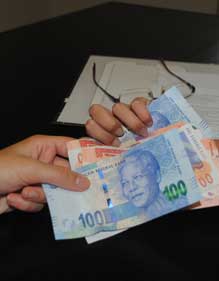
I know that corruption is not a problem unique to South Africa, but are we more corrupt than most countries? Is corruption in a developing country such as ours potentially more dangerous for society than in a wealthier country? – Seeking Comparison
Dear Seeking Comparison,
Transparency International is an organisation that highlights the problem of corruption worldwide. It monitors the perception of corruption in individual countries after capturing information gleaned from the public, analysts, business people and experts.
The Corruption Perceptions Index, which appears each year, uses a scoring system in which 0 indicates high levels of corruption and 100 indicating no corruption.
Out of 174 countries, Denmark scored the highest for 2012 with a score of 90 and Somalia scored the lowest at 8. South Africa came in at 69 with a score of 43, wedged between Macedonia and Bosnia-Herzegovina and beaten by a number of other African countries such as Rwanda, Namibia, Ghana and Lesotho (interestingly, we rank lower than Saudi Arabia, Cuba and Romania).
We are therefore not in the lower 50%, but we have fallen in 10 years from 36 in 2002 and a ranking of 32 in 1998 to our present place at 69 — a lamentable downward slide that shows no sign of slowing.
It is quite correct to say, as you do, that there is corruption in developed countries. Italy is a notable example, ranking lower than South Africa on the index at number 72 and with a total score of 42.
One may well ask how this could be?
Italy has a GDP that places it in the top 10 and an income per capita three times that of South Africa, yet it ranks lower on Transparency International’s index. The reasons for this are no doubt complex and many, but it is certain that Italy flourishes despite corruption, whereas many countries decline because of it.
Factors that contribute to the ability of countries to overcome the obstacles of corruption include :
• older, stronger democratic institutions form a final bulwark against corruption;
• a degree of meritocracy;
• relatively low income differentials; and
• high levels of productivity.
What is certain is that the stakes are higher for fledgling democracies such as our own, which is struggling to shape our own democratic identity, defining — and increasingly fighting — to save our democratic institutions and seeking to find ways in which to incorporate all citizens in public and economic life. We are in a sense a body not yet fully formed, which means that infant lesions or injuries are likely to become permanent deformities once adulthood is reached. That is why it is so important to get it right, and soon.
Earlier this week, Transparency International released another survey showing that one in four people around the world had paid a bribe in the past year; nearly half of South Africans admitted doing so.
Most people believe that corruption in their countries has worsened. It is important to appreciate that this survey is not of perceptions, but a sample of actual experiences of corruption.
The survey underpins the information Corruption Watch has been receiving from the public.
But with the worsening data comes hope: according to the report, between 61% and 80% of South Africans are willing to do something about corruption — whether it is saying no, reporting it, signing our pledge or a petition and spreading the word.
Opinions may differ on this, but as a relatively young democracy and a developing country we feel the devastating effects of corruption, precisely because so many South Africans are poor and the institutions designed to protect those most vulnerable to corruption are still being formed.
Hence, despite our higher ranking, South Africans may well experience corruption more keenly than, for example, Italy, which, having survived former prime minister Silvio Berlusconi, could probably survive anything.
• This article was first published in Sunday Times' Business Times

